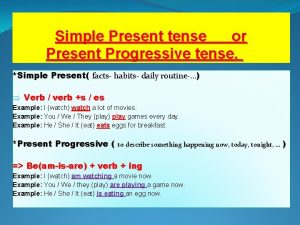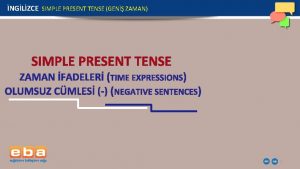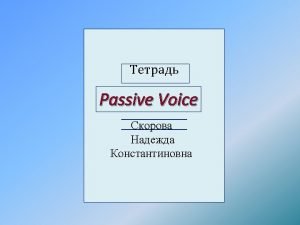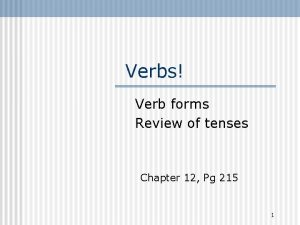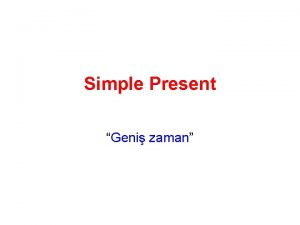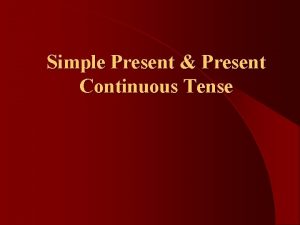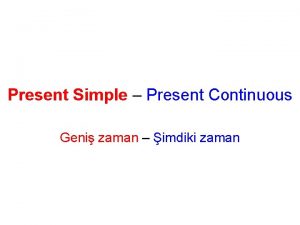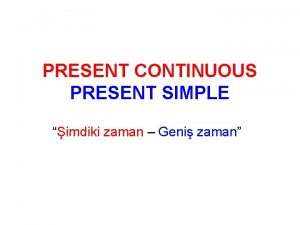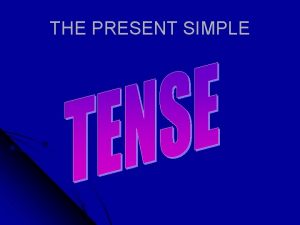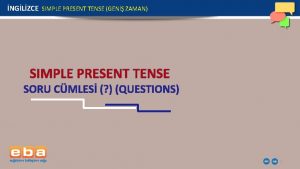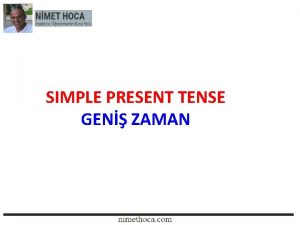Simple Present Tense Geni Zaman Geni zaman her












- Slides: 12

Simple Present Tense (Geniş Zaman)

• Geniş zamanı her zaman yaptığımız aktivitelerimiz için kullanırız. • Mesela sabah uyanmak, kahvaltı yapmak, okula gitmek gibi.

• Önce öznemizi, sonra fiilimizi, sonra da nesnelerimizi yazıp cümlemizi kurarız. • Olumlu cümlelerde, öznelerimiz he/she/it’ten biri olduğu zaman fiilimiz sonuna –s takısı alır. • Diğer öznelerde bir değişiklik yapılmaz.

• Örneğin; • I brush my teeth every morning. • We have a picnic on Saturdays. • She cleans her room every Sunday. • He visits his uncle on Fridays.

• Olumsuz cümlelerde ise I/we/you/they özneleri için özneden sonra don’t, he/she/it özneleri için doesn’t olumsuz ekini kullanırız. • Örneğin; • I don’t get up early at the weekend. • They don’t have breakfast in the mornings. • She doesn’t visit museum. • He doesn’t play basketball.

• Soru sorarken ise önce yardımcı fiil olan Do/Does, sonra özne, sonra da fiil ve nesneler sırasıyla kullanılır. Cevap da yes/no şeklinde olur. • Örneğin; • Do you get up early? Yes, I do. / No, I don’t. • Do Arda and Semih play football? Yes, they do. / No, they don’t.

• Does he have lunch at school? Yes, he does. / No, he doesn’t. • Does Selin clean her room at the weekend? Yes, she does. / No, she doesn’t.

• Time Expressions (Zaman İfadeleri) everyday every week every month every year every one hour every two months once a week twice a week three times a day four times a month five times a year

in the morning in the afternoon in the evening at night at the weekend on Mondays on Saturdays Zaman ifadeleri cümlenin en sonunda kullanılır.

• Adverbs of Frequency (Sıklık Zarfları) always (her zaman) usually (genellikle) often (sık sık) sometimes (bazen) seldom (nadiren) rarely/barely (neredeyse hiç) never (hiç)

• • I always get up early at the weekdays. She sometimes has breakfast at school. They usually go to school by bus. He never watches TV. It often drinks milk. We seldom play volleyball on Sundays. You barely play computer games at the weekend.

English Language Teacher Erdem DİRİCAN
 Past tense present tense future tense
Past tense present tense future tense Time expressions present continuous
Time expressions present continuous Present continuous tense in hindi
Present continuous tense in hindi Present progressive tense examples
Present progressive tense examples Simple present tense zaman ifadeleri
Simple present tense zaman ifadeleri Past continuous present simple
Past continuous present simple Past simple future
Past simple future Present simple past simple future simple test
Present simple past simple future simple test Present continuous vs future simple exercises
Present continuous vs future simple exercises Catenative verbs
Catenative verbs Present perfect tense vs present perfect continuous tense
Present perfect tense vs present perfect continuous tense Present perfect tense vs present perfect continuous tense
Present perfect tense vs present perfect continuous tense Present tense present continuous tense
Present tense present continuous tense



